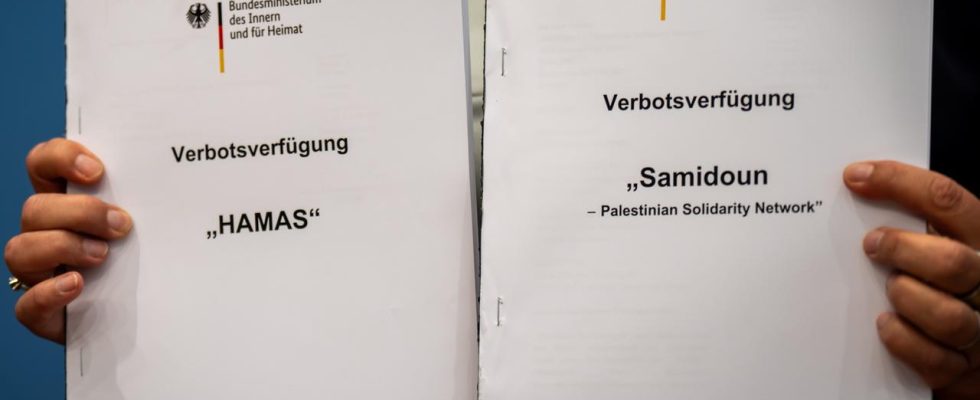faq
The Interior Minister is implementing what the Chancellor announced: the activities of Hamas and the Samidoun Association are now banned in Germany. An overview of the legal background.
What exactly are these bans?
The Ministry of the Interior has implemented the ban on Hamas’ activities and the ban on associations for the “Samidoun” network announced by the Federal Chancellor. Both measures are based on German association law.
A distinction is made between two forms: An “organizational ban” aims to completely destroy a club. This is possible for domestic and foreign clubs that have verifiable sub-structures in Germany. Such a complete ban has now been imposed on the “Samidoun” group. It has recently – but also in the past – organized demonstrations at which anti-Semitic and inciting slogans were chanted.
Hamas, on the other hand, is not a domestic association with clear structures, but rather a foreign organization. The EU has classified Hamas as a terrorist organization. The European Court of Justice has also reviewed and confirmed this classification. And the Federal Prosecutor General also classifies Hamas as a terrorist organization.
For such foreign organizations that are active in Germany but do not have fixed (association) structures, there may be a so-called “ban on activity” under German association law. Back in 2014, the then Interior Minister Thomas de Maizière (CDU) issued a ban on the activities of the so-called Islamic State (IS) in order to prevent its activities in Germany.
The ban on Hamas’s activities is not a legal novelty, nor is the ban on Samidoun’s organization.
Which requirements have these bans?
In general, a ban on associations – and also a ban on activities – is possible for associations “whose purposes or whose activities run counter to criminal law or which are directed against the constitutional order or against the idea of international understanding”. Interior Minister Nancy Faeser sees this fact as fulfilled.
A press release from the ministry states, among other things: “Samidoun (…) advocates and calls for the use of violence as a means of asserting political interests and supports associations that initiate, advocate and threaten attacks against people or property.”
A club ban generally has high hurdles. Because the clubs can rely on freedom of association. This is a fundamental right guaranteed by the constitution and is often linked to other freedoms, for example when clubs organize meetings or express a common opinion.
The ban must also be based on the entire behavior of a club. Criminal or unconstitutional actions by individual members are not sufficient for a ban. In the event of a dispute, the courts will decide. The bans can therefore be reviewed by the judiciary.
What are the consequences of such bans?
The consequences of the “organizational ban” for Samidoun and the “activity ban” for Hamas are basically the same: the association or group is no longer allowed to be active in Germany and, for example, is no longer allowed to organize meetings.
The use of his or her special license plates is prohibited and existing assets can be confiscated and confiscated. And: Anyone who maintains or supports the organizational cohesion of the club despite an existing ban is committing a criminal offense.


